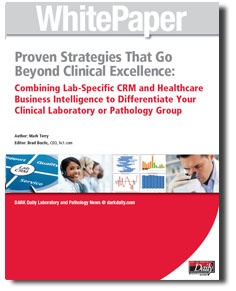Earlier this week, Dark Daily included remarks from hc1.com CEO Brad Bostic within the article, More Clinical Pathology Laboratories Use Middleware for Business Intelligence and Lab-specific Customer Relationship Management.
The article explains how clinical laboratories are rapidly adopting a lab-specific CRM, with healthcare business intelligence capabilities, because of the steady decline in lab reimbursements and laboratory budgets. These two trends have force d lab managers to look for solutions that help them reduce operating costs. To achieve this goal, along with improving quality and client service, labs must find a way to access essential, real-time data.
d lab managers to look for solutions that help them reduce operating costs. To achieve this goal, along with improving quality and client service, labs must find a way to access essential, real-time data.
"Today's clinical laboratory organization is rich in data, but this data does not improve client relationships unless integrated and presented in a way that allows laboratory staff to provide outstanding client service," said Bostic.
"A generic CRM might meet the needs of a company selling shoes or books, but the relationship management requirements of diagnostic laboratories are significantly more complex. A lab can try for years to customize a generic CRM system, but its underlying data model will, at best, capture only about 10% of the total client picture."
"For lab executives to truly benefit from a CRM strategy, the CRM must understand both clinical data and operational data -- along with the complex relationships between that data and the business activities of lab staff. Next, a lab-specific CRM should be capable of allowing the lab manager to identify trends in client service and client satisfaction in real time," Bostic added.
To find out how and why labs across the country are leveraging a healthcare CRM to differentiate their clinical lab or pathology group while delivering outstanding service, view the full Dark Daily article here.
To learn more about the hc1.com Healthcare Relationship Management solution and how it combines lab CRM with healthcare business intelligence, download the Dark Daily whitepaper.

